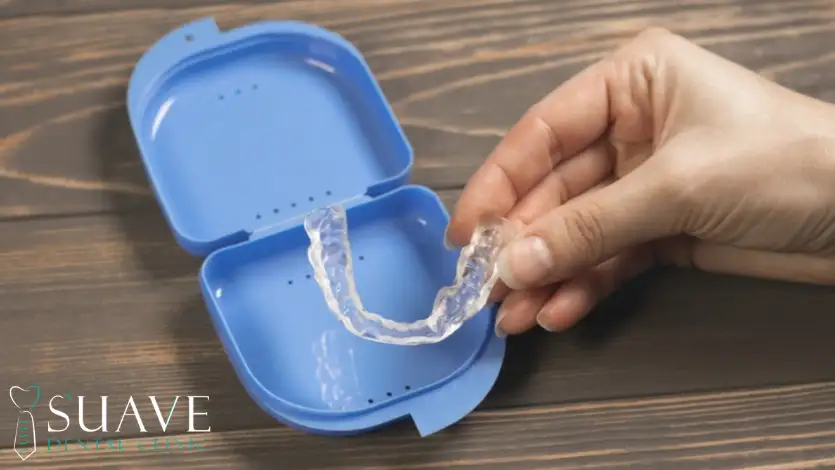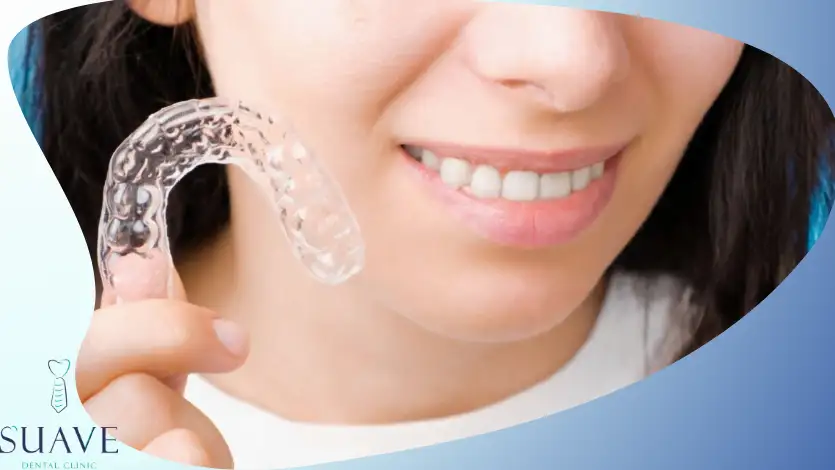
Table of Contents
If you have been waking up with jaw pain, morning headaches, or some ground teeth, you aren’t alone. These may be signs of bruxism, unconscious teeth grinding, or clenching during sleep.
What are Night Guards?
Night guards, also known as dental night guards for teeth grinding, bite guards, or night mouth guards, are protective oral appliances made of materials like plastic or acrylic that you wear over your teeth while sleeping.
They act as a protective barrier between your upper and lower teeth, absorbing the pressure from grinding or clenching.
Night guards are especially effective for conditions like TMJ disorders, bruxism, and even some types of sleep apnea.
Moreover, they may be used as mouthguards for athletes who participate in boxing, heavy contact sports, swimming, or are exposed to chlorinated water, to protect their teeth from the adverse effects of these chemicals.
What Are The Types Of Mouth Guards?
There are several types of night guards for teeth grinding, and each one serves a different purpose:
- Store-Bought Guards: Available at most pharmacies, markets, and online stores.
These include “boil-and-bite” styles that you can mold at home, and ready-to-use stock mouth guards. - There are OTC acrylic night guards. They are affordable but may not offer a perfect fit or long-term durability.
- Custom Night Guards:
These are considered the best night guards for teeth grinding and heavy contact sports, offering maximum comfort, durability, and effectiveness. - Dentists take a dental impression of the teeth set, and acrylic sheets are printed to perfectly fit the patient’s teeth and indentations, which maximizes protection
- Night Guard for TMJ: These are specially designed to reduce pressure on the jaw joint and relieve symptoms like clicking, soreness, or jaw locking.
- Mouth Guard for Bruxism: This helps relieve your teeth from the adverse effects of grinding and clenching, especially during sleep.
What Are Night Guards Made Of?
If you have ever wondered what makes the best night guard for teeth grinding, it is often about the materials.
Custom guards are typically made from durable acrylic or dual-laminate acrylic materials.
Hard acrylic guards are great for TMJ disorders, while softer ones may feel more comfortable for mild bruxism. Some patients prefer hybrid materials that offer both strength and flexibility.
Reasons To Use Night Guards:
Here are some signs telling you that you must use a mouth guard:
- You wake up with jaw tension or facial pain.
- Your teeth show signs of wear, chipping, or cracking due to bruxism.
- You suffer from TMJ issues, jaw pain, or unexplained headaches.
- You are being treated for sleep breathing problems like snoring and sleep apnea, where a slightly different oral appliance is used, which repositions the tongue and lower jaw.
- You participate in high-impact sports where you could risk high falls, your face might get hit, and your teeth could get broken or knocked out of your mouth, like boxing, wrestling, MMA, soccer, gymnastic sports like skating, biking, and any contact sports.
Bruxism and Stress
Modern lifestyles are often related to high stress levels, which can manifest physically, especially during sleep.
Although a night guard for teeth grinding doesn’t treat the root psychological cause, it prevents damage and offers relief to the patient.
Using a bite guard device at night helps reduce jaw tension, which can minimize your sleep awakenings, mid-sleep pain, muscle fatigue and improve sleep quality.
Special Considerations for Children and Teens
Children, especially between the ages of 5 and 12, often experience temporary sleep bruxism. In some cases, a soft night guard for teeth may be recommended to prevent damage to their developing teeth. For teens undergoing orthodontic treatment, a night mouth guard can also be designed to fit over braces or aligners.
The Downside of Wearing A Night Guard and Its Side Effects
Although night guards are generally safe, dental night guards can cause minor risks if they are not fitted correctly:
- Discomfort or soreness in the gingiva if the guard is too tight or loose.
- You may experience some speech difficulties until you get used to wearing it.
- Bacteria and debris accumulation in the fitting surface can lead to infection and unwanted smells if not cleaned properly.
- Ill-fitting guards may cause slight shifting of teeth over time, leading to malocclusion.
That is why custom-made night guards are highly recommended; they fit perfectly to your teeth and give an outline that provides more comfort and protection.
How much does a night guard cost at the dentist?
Mouth guards for teeth can vary depending on the type and material. At Suave Clinic in Turkey, prices for custom-made mouth guards are significantly more affordable than in many countries due to our high-quality and cost-effective dental services.
Here is the average cost of mouth guards:
- Store-bought guards: $20–$50
- Custom night guard made by a dentist in the clinic: $150–$300 internationally
Contact us at Suave Clinic, and book your visit that includes consultation, fitting, and follow-up to get the best service and price for you.

How to Use a Night Guard Properly?
- Put it in your mouth just before you go to bed.
- Ensure that it fits your mouth correctly and does not move around.
- Remove it first thing in the morning.
- Clean it properly to avoid bacterial infection
- If you feel discomfort, consult your dentist for any adjustments.
Typically, you will adapt to your night guard within a couple of weeks.
How to Clean Your Night Guard ?
Knowing how to clean a night guard is essential for your oral hygiene and the durability of your night guard:
- Rinse with cool water after each use.
- Gently brush the fitting surface with a toothbrush without using toothpaste, as it can scratch the night guard.
- Allow it to dry before storing.
- Use a specialized night guard cleaner weekly for deep cleaning.
- Store it in a ventilated container away from heat and keep it away from children and pets.
- Clean your night guard daily and bring it to dental checkups for professional assessment.
Why Wear a Mouthguard at Night?
A mouthguard is called a night guard cause it’s usually worn at bedtime, for several reasons:
- Prevent tooth damage from grinding or clenching, Bruxism during sleeping.
- Reduce tension in your jaw and muscles.
- Help manage TMJ disorders.
- Improve sleep by reducing disruptions from bruxism or jaw discomfort.
- Preserve dental restorations like crowns, bridges, or implants from distortion by the involuntary grinding and clenching.
How Long Should You Use A Mouthguard?
A high-quality, custom dental night guard can last a long (retention) time with proper care. However:
• Store-bought guards may wear out within months.
• Teens may need replacements more frequently due to jaw growth.
• Replace your guard if it becomes loose, broken, or discolored.
• Generally, with good care, a custom night guard can last up to 5 years or more.
At Suave Clinic, we specialize in crafting the best night guard for teeth grinding, TMJ, and bruxism.
As a premier destination for dental tourism in Turkey, we combine expert care, high-tech solutions, and affordable prices to give you a healthier smile and better sleep.
At Suave Clinic in Turkey, we offer the best dental solutions to meet your needs and are specially designed to protect your teeth and improve your quality of life.
Contact us today to book your consultation and protect your teeth for years to come.
Night Guards FAQs
Is Nightguard better on upper or lower teeth?
A Night Guard doesn’t have to cover all your teeth, as this depends on your bite, habits, and comfort. Your dentist will recommend the best option for you, either an upper, a lower night guard, or wearing both.
If you are an athlete or play contact sports, you should get upper and lower mouthguards for more protection.
If you are a bruxer, a dentist checks if the lower teeth are more damaged; he may suggest a lower nightguard only.
Do night guards shift teeth?
No, A custom Night Guard and Invisalign may look the same and be made out of the same material, but their mechanisms and the way they are used are totally different.
A Night Guard can’t shift teeth, as it’s a passive protector that covers teeth surfaces to avoid their harmful direct contact during sleeping.
Unlike Invisaligns, which are active orthodontic appliances used to straighten and correct mild crowding and malocclusion, they are advised to be used all day except during eating and sleeping.
Is it worth getting A Night Guard from the dentist?
Yes, a custom-made mouth guard is completely different and better than store mouthguards. A ready-made mouth guard perfectly fits the tooth surfaces and the surrounding gums. This fit causes less harm than a ready-made night guard, as:
– less gingival soreness and ulcerations
– Less debris or saliva escaping to the fitting surface causes cavities or a bad smell.
– Softer-fitting surface than ready-made ones
– More protective and secure
Is sleeping with a mouth guard dangerous?
Yes, if ill-fitted to teeth like the store-mouthguards, they possibly move involuntarily and obstruct the breathing airway while sleeping, resulting in choking or being swallowed by mistake in rare cases.
References
Medically Reviewe